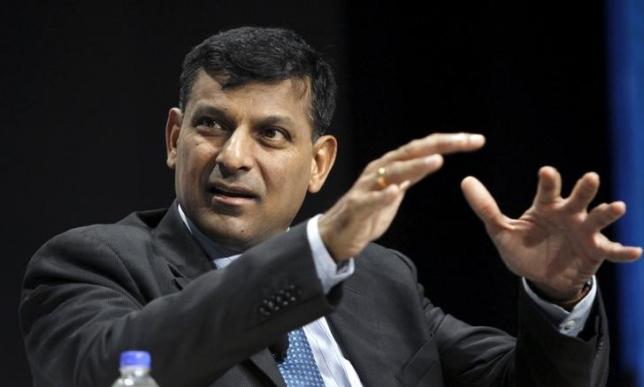
Mumbai: India’s government stayed mum on the fate of central bank Governor Raghuram Rajan as speculation over his future mounts. The rupee reversed gains, bonds declined, and foreign investors sold the most Indian debt in two weeks on Wednesday after a local-language newspaper reported that Rajan doesn’t want an extension of his term even though Prime Minister Narendra Modi wants him to stay on.
The Reserve Bank of India, the Prime Minister’s Office and the Finance Ministry all had no comment on the report, which was written by a long-time Delhi journalist for one of the country’s largest newspapers. "The appointment of RBI governor is not in my jurisdiction -- how can I reply?" Shaktikanta Das, one of the Finance Ministry’s top bureaucrats, told reporters when asked about the report after a cabinet meeting on Wednesday.
At the same briefing, Communications Minister Ravi Shankar Prasad said that no senior government officials would discuss Rajan’s future publicly and urged the media to avoid speculation. The uncertainty poses a risk for investors who see India’s fast-growing economy as an attractive bet while China slows and both Brazil and Russia endure contractions. Since taking office almost three years ago, Rajan has helped boost foreign-exchange reserves, stabilize the rupee and bring inflation under control. ‘Great Job’ "He’s done a great job,” Morgan Stanley economist Chetan Ahya said of Rajan.
"Hopefully the government and the central bank taken together will not lose sight of macro-stability. That’s what will be the key concern for investors." Rajan has recently come under attack from Subramanian Swamy, a prominent member of Modi’s party who argues that the shift to a consumer-inflation target has hurt the economy. Swamy has also said that Rajan’s time at the University of Chicago and International Monetary Fund has made him "mentally not fully Indian." Whether that holds sway with Modi is anyone’s guess. The prime minister told the Wall Street Journal last month that the decision could wait until September.
Either way, Swamy’s campaign poses a political dilemma for Modi if he wants to keep Rajan in place. Outspoken with a degree from Harvard University, Swamy is a forceful weapon against Modi’s political opponents who have blocked economic reforms in the upper house of parliament. So Modi has little incentive to have a public spat with Swamy over Rajan. Article Motive The report on Rajan’s desire to step down, published by Bengali-language newspaper Anandabazar Patrika, raised questions over the identity of the anonymous source, the motive for leaking details of the meeting and the accuracy of the story.
The daily is the most widely read in the capital of West Bengal, India’s fourth-most populous state. The rupee weakened 0.3 percent on Wednesday, the most since May 24, reversing an earlier gain of as much as 0.2 percent. Indian sovereign bonds also fell, with the yield on notes due January 2026 rising two basis points to 7.49 percent, its highest close since March 30. Overseas holdings of rupee-denominated government and corporate bonds dropped by 13.5 billion rupees ($200 million), most since May 17. If Rajan "cannot be reappointed for a second term, market confidence will be impaired, at least temporarily,” Gao Qi, a Hong Kong-based currency strategist, wrote in a report Thursday.
While the article created a buzz and moved the markets, it’s hard to know what it means. If true, it could either indicate that Rajan’s days are numbered or that Modi will make a last-ditch effort to get Rajan to stay. If false, it may be a signal to Rajan to pack his bags voluntarily while giving the impression that Modi isn’t getting rid of him under political pressure. "Rajan’s exit will definitely have a negative impact, but probably it won’t be lasting depending on who they put in that position," Mark Mobius, executive chairman of Templeton Emerging Markets Group, told Bloomberg on Thursday.
"If they can put in an equally capable, neutral, non-political person then the impact would be less. But the initial impact will be negative.” Unfinished Task Arvind Mayaram, a former Finance Ministry official, said Rajan would likely stay on if asked. The two worked closely together at the Finance Ministry before Rajan became central bank governor in September 2013. "My sense is Rajan is a person who doesn’t leave unfinished tasks, and as yet his task is unfinished," Mayaram said.
"So he will not ask for an extension, but if offered he wouldn’t deny it." The topic of reappointment came up repeatedly at a conference in Singapore, where "investors unequivocally wanted Governor Rajan to continue," according to a Deutsche Bank AG report last month. Finance Minister Arun Jaitley declined to comment on the matter in an interview on Monday, saying the government would decide at the appropriate time. Even so, Rajan is only a piece of what makes India attractive. Pacific Investment Management Co., which oversees about $1.5 trillion in assets globally, says that the growth trajectory and financial health of India’s economy will support rupee bonds regardless of who helms the central bank.
While no one is indispensable, "the quality of his replacement will then matter a great deal," according to Jan Dehn, London-based head of research at Ashmore Group Plc, which manages about $51 billion in emerging markets. "It would not be easy to find someone as credible as Rajan," Dehn said. "Too much political pressure on the central bank to lower rates leads to inflation and capital outflows. This is the route to disaster."